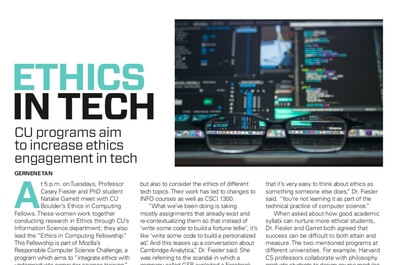Computing Ethics at CU Boulder
May 15, 2020

CU Boulder's Ethics in Computing Fellowship aims to increase tech ethics engagement among students. I spoke with Casey Fiesler and Natalie Garret about the fellowship and other ethics initiatives.
At 5 p.m. on Tuesdays, Professor Casey Fiesler and PhD student Natalie Garrett meet with CU Boulder’s Ethics in Computing Fellows. These women work together conducting research in Ethics through CU’s Information Science department; they also lead the “Ethics in Computing Fellowship”. This Fellowship is part of Mozilla’s Responsible Computer Science Challenge, a program which aims to “integrate ethics with undergraduate computer science training.” CU was selected as one of 18 universities to receive funding from the grant, and the fellowship is one measure individuals have taken to increase ethics engagement within the university community—especially in Computer Science.
“For a long time, I have been thinking about how ethics should be part of an entire curriculum as opposed to a single class. Here at CU, in Computer Science, there wasn’t a single class until fairly recently,” Dr. Fiesler said. Dr. Fiesler’s hope is that an improved ethical awareness across the Computer Science student body will stir conversation on ethical awareness and perhaps enhance students’ learning experience. “I had this theory that if lots of great ethically engaged students come and talk about it a lot and have it on their mind and learn a lot of new things then maybe [they’ll] go back to your classes and bring up issues and just be ethically engaged students in [their] classes.”
During fellowship meetings, students discuss current events surrounding tech ethics and participate in different workshops. Later in the semester, they help brainstorm ways to incorporate ethics into programming activities for introductory CS courses. Dr. Fiesler and Garrett have already been collaborating with faculty to integrate ethics components into course materials: they’ve helped to modify lab-based assignments to not only teach students technical skills, but also to consider the ethics of different tech topics. Their work has led to changes to INFO courses as well as CSCI 1300.
“What we’ve been doing is taking mostly assignments that already exist and recontextualizing them so that instead of ‘write some code to build a fortune teller’, it’s like ‘write some code to build a personalized ad.’ And this teases up a conversation about Cambridge Analytica,” Dr. Fiesler said. She was referring to the scandal in which a company called GSR exploited a Facebook security loophole to harvest user data and sell at least some of it to Cambridge Analytica. Cambridge Analytica then used the data for political profiling.
Currently, the only ethics requirement for CS (BS) students is a single three-credit ethics course. Students are given a choice between:
- INFO 4601-3, Information Ethics and Policy
- PHIL 1100-3, Ethics
- PHIL 1200-3, Philosophy and Society
- PHIL 2160-3, Ethics and Information Technology
- EHON 1151-3, Critical Encounters
Not all of the options have a technology-centric component. Ask computer science students how frequently ethics are discussed in their classes, and you might be surprised to hear that often, students struggle to recall any mention of it. Students learn how to execute code injection attacks, design databases, and build machine learning algorithms but not necessarily explore the moral dilemmas involved with such decisions.
“I think that the ideal [scenario] is to have both a required standalone tech ethics class and to [integrate ethics with other classes] . The reason I think this is so important is that it’s very easy to think about ethics as something someone else does,” Dr. Fiesler said. “You’re not learning it as part of the technical practice of computer science.”
When asked about how good academic syllabi can nurture more ethical students, Dr. Fiesler and Garret both agreed that success can be difficult to both attain and measure. The two mentioned programs at different universities; for example, Harvard CS professors collaborate with philosophy graduate students to design course modules, and Georgia Tech provides a class that teaches ethics through sci-fi. These programs are resource-intensive, but the belief is that they bring enormous benefits to students.
“I think it’s important to make [ethics] part of your classes early so that you learn that this is part of computer science,” Dr. Fiesler said. “But honestly with the amount that we see on the news constantly about this, it’s hard to say that it’s not relevant.”
Garrett added, “Anecdotally, when I present these types of topics to the intro students, I see their faces shift and change like, ‘Oh my gosh I never thought about that.’ I think that is the most important first step. We should be sharing what controversies are happening and what questions we should all be asking. And really what the landscape is.”
Dr. Fiesler hopes to continue the Ethics in Computing Fellowship for future years, and she also discussed plenty of different ways for students to get involved. For those interested in exploring ethics in tech, there are plenty of options to check out:
- Enroll in a tech ethics class.
- Engage in tech ethics research.
- Stay up to date with tech ethics current events.
- Bring ethics discussions to the classroom. Positive change can begin with just one conversation.
 Gernene
Gernene